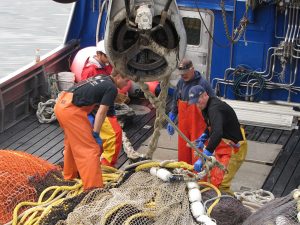Battling the Bering Sea: The High Stakes of Safety for Commercial Fishermen
 Alaska’s commercial fishing industry, a significant part of the state’s economy, involves working in challenging marine environments. The pursuit of seafood means confronting hazardous conditions, which leads to injuries and fatalities each year. But it doesn’t have to be this way. Understanding the safety measures in place and the legal avenues available, such as the Jones Act, is important for those working at sea.
Alaska’s commercial fishing industry, a significant part of the state’s economy, involves working in challenging marine environments. The pursuit of seafood means confronting hazardous conditions, which leads to injuries and fatalities each year. But it doesn’t have to be this way. Understanding the safety measures in place and the legal avenues available, such as the Jones Act, is important for those working at sea.
Working as a commercial fisherman in Alaska carries a greater risk of injury and death than many other jobs. Several factors contribute to these risks:
- Challenging Weather and Icing: Alaska’s marine weather can change quickly. Sudden storms, strong winds, and large waves can make fishing difficult. Ice accumulating on vessels, particularly during colder seasons, can affect a boat’s stability.
- Long Work Periods: Fishing seasons can be brief and intensive, often requiring extended work hours with limited rest. Fatigue can reduce a crew member’s alertness and response time, increasing the chance of accidents.
- Heavy Gear: Fishing boats use powerful equipment like winches, nets, and traps. Operating this machinery requires careful attention, as it can cause serious injuries if not handled properly. Entanglement in lines or nets is a common hazard.
- Remote Locations: Many Alaskan fishing areas are far from shore and medical facilities. A serious injury at sea or a vessel emergency in these locations can mean a delay in receiving aid. Falling overboard in cold water can quickly lead to hypothermia.
Despite these inherent risks, federal law provides protections for injured fishermen. The Jones Act is a key piece of legislation that allows commercial fishermen to seek compensation if they are injured due to employer negligence or an unseaworthy vessel. This differs from standard workers’ compensation, as it enables injured seamen to sue their employers directly for various damages, including:
- Medical Costs: This covers past and future expenses for treatment and rehabilitation.
- Lost Income: Compensation for earnings lost, both in the past and projected for the future.
- Pain and Suffering: Acknowledgment of physical discomfort and emotional distress.
- Maintenance and Cure: A specific maritime benefit that provides daily living expenses (maintenance) and covers medical care (cure) until the fisherman has recovered as much as medically possible.
To succeed with a Jones Act claim, it is generally necessary to show that the employer’s lack of care, even minor, played a part in the injury, or that the vessel was “unseaworthy.” This could involve issues such as equipment that was not working correctly, insufficient training, too few crew members, unsafe procedures, or a lack of appropriate safety gear.
Efforts to enhance safety in Alaskan commercial fishing continues. Organizations like the U.S. Coast Guard and the Alaska Marine Safety Education Association (AMSEA) conduct vessel safety checks, offer maritime safety training, and enforce regulations regarding emergency equipment, vessel stability, and operational procedures. While these actions have helped, the nature of the industry means that vigilance, proper training, and adherence to safety guidelines are essential for every fisherman operating in Alaskan waters. For those who experience an injury at sea, understanding your rights under the Jones Act can be an important step in the recovery process.
For those in high-risk professions, comprehensive training, advanced safety gear, and consistent readiness are paramount. Legal professionals specializing in maritime cases are well aware that safety protocols are vital for preventing harm, and they see firsthand the devastating impact when these standards are neglected. If you’re seeking guidance on a maritime legal issue or have inquiries about your entitlements, a consultation with an experienced firm can be a valuable first step. Stacey and Jacobsen, PLLC is one of the most experienced Maritime Law Firms in the nation. They understand the essential role safety measures play in saving lives and the devastating consequences when such measures fall short. If you or a loved one is in need of Maritime Law assistance or have questions about your rights, call (877) 332-5529 for a free consultation.
 Maritime Injury Law Blog
Maritime Injury Law Blog

